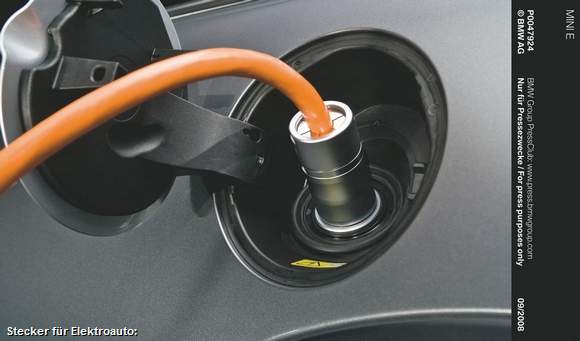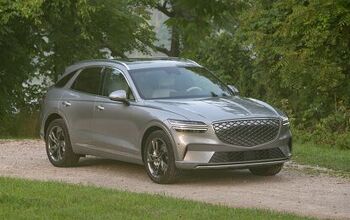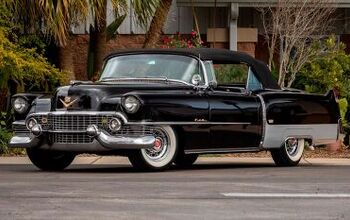German Government Wants Fast EVs Fast

As documented here, German carmakers mostly talk about EVs, but build very few. Volkswagen’s Christian Klingler even said that customers don’t want EVs, only governments do. He’s sure right about the government part. The German government prods its carmakers to get on with the building of EVs. Germany’s Economy Minister Brüderle (the very same that said no to Opel help) demanded “more tempo” in the EV department. The German government wants to see a million EVs by 2020. The government is worried that the Germans are missing the (electric) train. Just like the automakers, the government is a lot of talk, and little action.
“We have invented the car around here,” said Brüderle. He doesn’t want that leadership go to countries like China, Japan, Korea, the U.S., or, oh mein Gott, even France. What’s the answer of the German industry? Show us the money, then we talk. They think a decent research program costs $5b, and they want the government to pay most of that. The government is thinking about its share. Most of all, the automakers want inducements to go to buyers of EVs. Just like in the aforementioned countries. “No way” is Brüderle’s answer. He wants to “leave the electromobility to the market forces.” The industry thinks EVs are a tough sell with inducements. Without, they are unsalable.
According to the German rule “wenn man nicht mehr weiter weiss, gründet man nen Arbeitskreis” (if you see no way out, start a committee), the Germans started the Nationale Plattform Elektromobilität (NPE), which did what Germans do best: The developed a norm for EVs. Well, at least the roadmap for a norm, as Automobilwoche [sub] reports. For ar real standard, they need a real budget. This is going nowhere fast.

Bertel Schmitt comes back to journalism after taking a 35 year break in advertising and marketing. He ran and owned advertising agencies in Duesseldorf, Germany, and New York City. Volkswagen A.G. was Bertel's most important corporate account. Schmitt's advertising and marketing career touched many corners of the industry with a special focus on automotive products and services. Since 2004, he lives in Japan and China with his wife <a href="http://www.tomokoandbertel.com"> Tomoko </a>. Bertel Schmitt is a founding board member of the <a href="http://www.offshoresuperseries.com"> Offshore Super Series </a>, an American offshore powerboat racing organization. He is co-owner of the racing team Typhoon.
More by Bertel Schmitt
Latest Car Reviews
Read moreLatest Product Reviews
Read moreRecent Comments
- Kjhkjlhkjhkljh kljhjkhjklhkjh A prelude is a bad idea. There is already Acura with all the weird sport trims. This will not make back it's R&D money.
- Analoggrotto I don't see a red car here, how blazing stupid are you people?
- Redapple2 Love the wheels
- Redapple2 Good luck to them. They used to make great cars. 510. 240Z, Sentra SE-R. Maxima. Frontier.
- Joe65688619 Under Ghosn they went through the same short-term bottom-line thinking that GM did in the 80s/90s, and they have not recovered say, to their heyday in the 50s and 60s in terms of market share and innovation. Poor design decisions (a CVT in their front-wheel drive "4-Door Sports Car", model overlap in a poorly performing segment (they never needed the Altima AND the Maxima...what they needed was one vehicle with different drivetrain, including hybrid, to compete with the Accord/Camry, and decontenting their vehicles: My 2012 QX56 (I know, not a Nissan, but the same holds for the Armada) had power rear windows in the cargo area that could vent, a glass hatch on the back door that could be opened separate from the whole liftgate (in such a tall vehicle, kinda essential if you have it in a garage and want to load the trunk without having to open the garage door to make room for the lift gate), a nice driver's side folding armrest, and a few other quality-of-life details absent from my 2018 QX80. In a competitive market this attention to detai is can be the differentiator that sell cars. Now they are caught in the middle of the market, competing more with Hyundai and Kia and selling discounted vehicles near the same price points, but losing money on them. They invested also invested a lot in niche platforms. The Leaf was one of the first full EVs, but never really evolved. They misjudged the market - luxury EVs are selling, small budget models not so much. Variable compression engines offering little in terms of real-world power or tech, let a lot of complexity that is leading to higher failure rates. Aside from the Z and GT-R (low volume models), not much forced induction (whether your a fan or not, look at what Honda did with the CR-V and Acura RDX - same chassis, slap a turbo on it, make it nicer inside, and now you can sell it as a semi-premium brand with higher markup). That said, I do believe they retain the technical and engineering capability to do far better. About time management realized they need to make smarter investments and understand their markets better.


































Comments
Join the conversation
What the F does an "Economy Minister" actually do? Does anyone really question what these parasites qualifications are? These filthy maggots have no idea what it takes to produce anything. Know wonder you go out of Germany, Bertel...Didn't want to be a slave of the State/Greeks? Or just tired of the Democracy Parasite (aka, Voters and their political gangsters) stealing 75% of your income?
If they're not putting money in--the gov--seems to me they don't want it. I don't blame them. The battery is still a crapshoot.